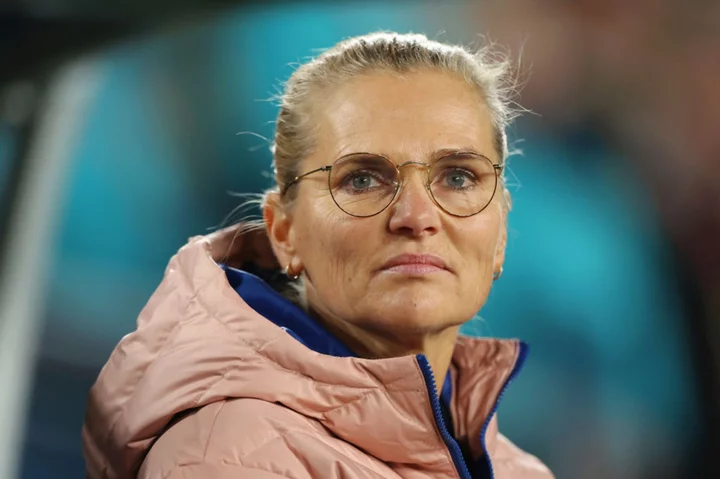In the final days before a World Cup final, when every touch on the training ground is charged with greater tension, it’s still difficult not to revert to the lightness of youth. That is where the very meaning of all this is first set. “When I was a kid we used to play ‘World Cup’ in the garden, where we had to score to stay in,” striker Alessia Russo smiles in England’s base. “It was having fun and playing free… as a kid growing up, to think we’re playing in a World Cup final in a couple of days is a special feeling.” It is a feeling that is universal when it comes to this game, because this game is truly unique. Nothing else comes near. It is why everyone is here. Jenni Hermoso expressed exactly the same emotions in the Spain camp. “Everything I do on the pitch I learned it on the street, playing in my neighbourhood, playing in the park underneath my grandparents’ house… of course you imagine winning, you visualise going back to Spain with the World Cup. I hope that dream becomes reality.” The manner these players inspire next generations means these simple joys should not be forgotten, as all of these players seek to do something that will be remembered forever. It is this elementary excitement that really makes such an occasion, although the 2023 World Cup final still involves a seriousness that goes beyond elite players doing what is necessary to win “the game of their careers” and Sarina Wiegman’s immense decision over Lauren James. Sunday’s match at Stadium Australia is the most meaningful fixture in women’s football history - which may sound a basic statement, but has more to it than that. It is a description that is going to be true with every World Cup final in a rapidly expanding women’s game, but feels especially important when the hosts embrace it like Australia have. Audience records have been broken. Barriers have been left far behind. This has been a truly game-changing World Cup, in so many senses. That spread of the sport has been reflected in a thrillingly unpredictable World Cup, where a later start has helped a tranche of developing football nations further bridge the gap to a more defined top level. The mismatches never happened. The tournament was instead intense from the start, characterised by upsets that became less surprising as it went on, but no less entertaining. Australia-New Zealand 2023 has had much that you would want from a World Cup: fine goals, dramatic moments, engaging matches, great storylines, all imbued with deeper themes. The most influential was probably the demise of the deposed champions, USA, that was made all the more stunning by the manner they went out. The millimetres of that penalty decision reflected the closing gaps. It all means a highly entertaining World Cup now has a fittingly high-quality final, contested by two of its finest sides; the European champions against a team driven by Barcelona’s Champions League winners. The persistence of England and Spain still fits with the trend of upsets, while explaining the wider competition. Both have overcome huge problems to be here. Spain are perhaps the most strife-torn squad to have ever made it this far in any World Cup. The feeling with England was that you can’t lose players like Leah Williamson, Beth Mead and Fran Kirby and expect to win a World Cup. Both have overcome all this because of what is maybe the single biggest factor in the women’s game now. They are two wealthy, western European countries that have industrialised talent production through infrastructure overhauls. This has been met by more investment in the women’s game than most, even if that still has some way to go. It is symbolic that both finalists have had considerable complaints related to finance, Spain with the preparation standards that were one of the reasons for a rebellion, England with an ongoing dispute over bonuses. Both echo issues throughout this tournament, from Nigeria to Australia, illustrating why Gianni Infantino shouldn’t have been as predictably self-congratulatory as he was on Friday. The Fifa president was nevertheless correct on interest in this World Cup, as the governing body for once deserve credit for their own investment. “Over a million spectators in the stadia, over one billion viewers on TV,” Infantino said. “It was a turning point for women’s football. But this World Cup here has been truly transformational, not only in Australia or New Zealand but all over the world.” He’s right. That turning point needs to keep rolling into further revolutions. Other nations need to at least aim for what England and Spain are doing. On the Stadium Australia pitch itself, their resources have created a compelling football contrast. It’s a classic case of ideology against pragmatism. Spain’s coaching culture has created what is by far the strongest and deepest football identity in the women’s game, which is why controversial coach Jorge Vilda is almost irrelevant in that regard. The passing-pressing game executed by high-quality players like Aitana Bonmati and Alexia Putellas supersedes almost everything, including most opposition. But maybe not England. The FA’s resources have instead brought the best manager in the women’s game, who has marked herself apart through the ability to adapt to virtually any situation. If the story of Spain’s run to the final has been setting aside one defining problem, the story of England’s has been solving a series of developing problems. Wiegman has responded to everything with inspiration, from injuries to the suspension of James. The team, in her own words, have “grown” through this World Cup. Wiegman now has to come up with a response to Spain in the space of just three days, since their possession will dictate the game. There is at least a lot to go off, and not just the footage her staff pored over from Wednesday night to Friday afternoon to have ready for the preparation sessions before the final. Facing the specific Spanish approach has been one of the most clearly defined tests in the sport, going back two decades in the men’s game. Managers know they will seek to dominate the ball as high up the pitch as possible. It can be exhausting. The challenge is to disrupt that while managing space and offering a threat of your own. That might actually suit Wiegman’s new 3-5-2, another mid-tournament solution. The fact so many of her attackers have come to scoring form at the right time only bolsters that, especially as Spain have a capacity for chaos in their own area. The great danger is tournament revelation Salma Paralluelo causing havoc at the other end. It remains one of the exhilarating truths of football. There is almost no defending such a rapid turn of direction. That only informs Wiegman’s huge decision on James, though. It might well be the most important decision in the history of English women’s football, given what it could mean. It’s just as well Wiegman can bear the responsibility, as she specifically spoke about the need to stop talking about 1966 and all that. She was almost totally unwilling to talk about her own personal feelings of losing the last final in 2019 with Netherlands, after all. She doesn’t think that helps anyone. The Spanish media were still too willing to compare the James decision to Jimmy Greaves. There is an obvious allure to putting such a player straight back in against a backline as open as Spain’s. That Spanish flaw may well create another historic anomaly. Having been eviscerated 4-0 by Japan, Spain could become the first team to have lost by more than two goals in a Women’s World Cup and still won it. The only previous champions to have lost at all were Japan 2011, the historic quirks only amplified by how it was England who beat them. Wiegman’s side can offer a precedent of their own, though. They would become the first world champions to have beaten someone from every confederation, truly living up to the title. Both of these teams would really be the worthiest of winners, though, and there’s one piece of history that is more important than any other. One country will win the Women’s World Cup for the first time. They’re going to find there’s nothing like it. The childhood dream is one thing. The reality is something else. It will be revealed on a charged Stadium Australia pitch on Sunday. Read More Sarina Wiegman: ‘Stop talking about the result — we know what we want’ Ella Toone or Lauren James? Sarina Wiegman has already made the biggest decision of England’s World Cup Infighting and rebellion: How Spain overcame themselves to reach edge of Women’s World Cup glory ‘Disappointing’: Prince William blasted by Lionesses fans for missing Women’s World Cup final in Australia Women’s World Cup LIVE: Sarina Wiegman says ‘everyone’s talking about 1966’ and backs England to end hurt Where to watch the Women’s World Cup final between England and Spain
In the final days before a World Cup final, when every touch on the training ground is charged with greater tension, it’s still difficult not to revert to the lightness of youth. That is where the very meaning of all this is first set.
“When I was a kid we used to play ‘World Cup’ in the garden, where we had to score to stay in,” striker Alessia Russo smiles in England’s base. “It was having fun and playing free… as a kid growing up, to think we’re playing in a World Cup final in a couple of days is a special feeling.”
It is a feeling that is universal when it comes to this game, because this game is truly unique. Nothing else comes near. It is why everyone is here. Jenni Hermoso expressed exactly the same emotions in the Spain camp.
“Everything I do on the pitch I learned it on the street, playing in my neighbourhood, playing in the park underneath my grandparents’ house… of course you imagine winning, you visualise going back to Spain with the World Cup. I hope that dream becomes reality.”
The manner these players inspire next generations means these simple joys should not be forgotten, as all of these players seek to do something that will be remembered forever. It is this elementary excitement that really makes such an occasion, although the 2023 World Cup final still involves a seriousness that goes beyond elite players doing what is necessary to win “the game of their careers” and Sarina Wiegman’s immense decision over Lauren James.
Sunday’s match at Stadium Australia is the most meaningful fixture in women’s football history - which may sound a basic statement, but has more to it than that. It is a description that is going to be true with every World Cup final in a rapidly expanding women’s game, but feels especially important when the hosts embrace it like Australia have. Audience records have been broken. Barriers have been left far behind. This has been a truly game-changing World Cup, in so many senses.
That spread of the sport has been reflected in a thrillingly unpredictable World Cup, where a later start has helped a tranche of developing football nations further bridge the gap to a more defined top level. The mismatches never happened. The tournament was instead intense from the start, characterised by upsets that became less surprising as it went on, but no less entertaining. Australia-New Zealand 2023 has had much that you would want from a World Cup: fine goals, dramatic moments, engaging matches, great storylines, all imbued with deeper themes.
The most influential was probably the demise of the deposed champions, USA, that was made all the more stunning by the manner they went out. The millimetres of that penalty decision reflected the closing gaps.
It all means a highly entertaining World Cup now has a fittingly high-quality final, contested by two of its finest sides; the European champions against a team driven by Barcelona’s Champions League winners. The persistence of England and Spain still fits with the trend of upsets, while explaining the wider competition. Both have overcome huge problems to be here. Spain are perhaps the most strife-torn squad to have ever made it this far in any World Cup. The feeling with England was that you can’t lose players like Leah Williamson, Beth Mead and Fran Kirby and expect to win a World Cup.
Both have overcome all this because of what is maybe the single biggest factor in the women’s game now. They are two wealthy, western European countries that have industrialised talent production through infrastructure overhauls. This has been met by more investment in the women’s game than most, even if that still has some way to go.
It is symbolic that both finalists have had considerable complaints related to finance, Spain with the preparation standards that were one of the reasons for a rebellion, England with an ongoing dispute over bonuses. Both echo issues throughout this tournament, from Nigeria to Australia, illustrating why Gianni Infantino shouldn’t have been as predictably self-congratulatory as he was on Friday. The Fifa president was nevertheless correct on interest in this World Cup, as the governing body for once deserve credit for their own investment.
“Over a million spectators in the stadia, over one billion viewers on TV,” Infantino said. “It was a turning point for women’s football. But this World Cup here has been truly transformational, not only in Australia or New Zealand but all over the world.”
He’s right.
That turning point needs to keep rolling into further revolutions. Other nations need to at least aim for what England and Spain are doing.
On the Stadium Australia pitch itself, their resources have created a compelling football contrast. It’s a classic case of ideology against pragmatism.
Spain’s coaching culture has created what is by far the strongest and deepest football identity in the women’s game, which is why controversial coach Jorge Vilda is almost irrelevant in that regard. The passing-pressing game executed by high-quality players like Aitana Bonmati and Alexia Putellas supersedes almost everything, including most opposition.
But maybe not England.
The FA’s resources have instead brought the best manager in the women’s game, who has marked herself apart through the ability to adapt to virtually any situation. If the story of Spain’s run to the final has been setting aside one defining problem, the story of England’s has been solving a series of developing problems. Wiegman has responded to everything with inspiration, from injuries to the suspension of James. The team, in her own words, have “grown” through this World Cup.
Wiegman now has to come up with a response to Spain in the space of just three days, since their possession will dictate the game. There is at least a lot to go off, and not just the footage her staff pored over from Wednesday night to Friday afternoon to have ready for the preparation sessions before the final. Facing the specific Spanish approach has been one of the most clearly defined tests in the sport, going back two decades in the men’s game. Managers know they will seek to dominate the ball as high up the pitch as possible. It can be exhausting. The challenge is to disrupt that while managing space and offering a threat of your own.
That might actually suit Wiegman’s new 3-5-2, another mid-tournament solution. The fact so many of her attackers have come to scoring form at the right time only bolsters that, especially as Spain have a capacity for chaos in their own area.
The great danger is tournament revelation Salma Paralluelo causing havoc at the other end. It remains one of the exhilarating truths of football. There is almost no defending such a rapid turn of direction. That only informs Wiegman’s huge decision on James, though. It might well be the most important decision in the history of English women’s football, given what it could mean.
It’s just as well Wiegman can bear the responsibility, as she specifically spoke about the need to stop talking about 1966 and all that. She was almost totally unwilling to talk about her own personal feelings of losing the last final in 2019 with Netherlands, after all. She doesn’t think that helps anyone. The Spanish media were still too willing to compare the James decision to Jimmy Greaves. There is an obvious allure to putting such a player straight back in against a backline as open as Spain’s.
That Spanish flaw may well create another historic anomaly. Having been eviscerated 4-0 by Japan, Spain could become the first team to have lost by more than two goals in a Women’s World Cup and still won it. The only previous champions to have lost at all were Japan 2011, the historic quirks only amplified by how it was England who beat them.
Wiegman’s side can offer a precedent of their own, though. They would become the first world champions to have beaten someone from every confederation, truly living up to the title.
Both of these teams would really be the worthiest of winners, though, and there’s one piece of history that is more important than any other. One country will win the Women’s World Cup for the first time. They’re going to find there’s nothing like it. The childhood dream is one thing. The reality is something else. It will be revealed on a charged Stadium Australia pitch on Sunday.
Read More
Sarina Wiegman: ‘Stop talking about the result — we know what we want’
Ella Toone or Lauren James? Sarina Wiegman has already made the biggest decision of England’s World Cup
Infighting and rebellion: How Spain overcame themselves to reach edge of Women’s World Cup glory
‘Disappointing’: Prince William blasted by Lionesses fans for missing Women’s World Cup final in Australia
Women’s World Cup LIVE: Sarina Wiegman says ‘everyone’s talking about 1966’ and backs England to end hurt
Where to watch the Women’s World Cup final between England and Spain









